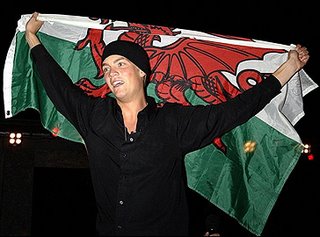Glyn Wise: A Welsh Speaking Hero!
 Who would of thought it? A young local patriotic welsh speaker - with aspirations of becoming a Welsh teacher and Plaid president, who would ban people buying second homes in Welsh speaking areas, and who'd dethrone Charles as Prince of Wales - would take 2nd place in Channel 4’s Big Brother final?
Who would of thought it? A young local patriotic welsh speaker - with aspirations of becoming a Welsh teacher and Plaid president, who would ban people buying second homes in Welsh speaking areas, and who'd dethrone Charles as Prince of Wales - would take 2nd place in Channel 4’s Big Brother final?A lot of people mock Big Brother, and for good reasons. But this series was different. For the first time ever there were two Welsh speakers in the house (it wouldn‘t have worked with just one Welsh speaker, of course) who constantly conversed together in their first language. By doing so, he and fellow housemate Imogen Thomas (from Llanelli) have shown that Cymraeg is a living language to millions across Britain and Ireland. And that doesn't happen very often.
Equally important, Glyn and Imogen have shown what it means to be Welsh. Wales is not just about Cardiff, rugby and the Valleys; it’s also about the language. In fact, it’s probably the language which defines us as a distinct nation more than anything else.
At first they were banned from speaking “in code” but this decision was later reversed, and subtitles were used. Towards the end, even BB was speaking Welsh and Glyn was given the task of teaching Welsh to some of the housemates. For this, the producers of BB are to be congratulated.
To see Glyn’s constant and abounding enthusiasm for Wales, Cymraeg, y Ddraig Goch, and all things Welsh was brilliant. For once I have to agree with Rhodri Morgan: "Your passion and love for our country and language has been an inspiration for other young people and you've certainly put your home town of Blaenau Ffestiniog and Wales on the map.
"Your conversations in the house with Imogen have certainly raised the profile of the Welsh language to a new audience all over the world."

3 Comments:
Jim:
Yes, I'd agree that simply having a language as the only defining factor in a culture would be "incredibly sad". But I didn't say that. The point I made was that Cymraeg is the thing which defines us MOST as a distinct nation; meaning, it is something which is inherently Welsh and not shared by any other nation. But there are lots of other things as well - our history, our political structure, our festivals, our attitudes, even our landscape.
Anyway, thanks for your comments. It's good to know someone is reading the blog.
S'mai Wynne
Dwi'n licio'r blog, beth am ei hyrwyddo ychydig drwy ymweld â blogiau eraill tebyg a gadael sylw?
I like the blog, how about promoting it a bit by visiting similar blogs and leaving comments?
Jim,
You ask an interesting question, but what exactly do you mean by an '"English" [way of] life'? I'd argue that we in Wales have a lot in common with our English neighbours an not just the ability to speak the same language as them (our love of beer and football comes to mind first). But I believe that we think a little diffent to the English on a range of issues no matter which language we speak.
Why do we bother with a language? [when everything can be done in Eglish?]
We do have a Welsh langugae culture (music poetry etc) so if we couldn't read and write in Welsh, we'd non longer have acces to this. As history is usually written by the victor, a lot of Welh history is written in English from an English pespective. Welsh history and poetry written in Welsh gives us a completly different angle on things. Also we've been speaking to each other in Welsh for generations, the thought of speaking in English to family and the majority of my friens just seems wierd and un-natural to me.
To me (and others) the language isn't just something we use to communicate through work, play and love, it also affects the way we think and how we see the world.
Jim,
It sounds to me like you're trying to argue against a position whilst having very little knowledge of what you are actually arguing against. How much Welsh-speaking culture have you experienced? It appears you are speaking as an "observer", not a participant. You really need to speak Welsh to get close to the culture, otherwise you're going to have a very stunted concept of it.
Welsh-culture, both historically and currently, is not simply a mirror-image of "English" culture spoken in Welsh. Do you really think we would have fought so hard and long to preserve our culture if that was the case? Welsh culture has its own idiosyncrasies, it's own ways of thinking, it's own values, etc.
In the case of music, the Welsh-language music scene is actually thriving. For many bands, singing in English simply would not work. There are expressions and ways of saying things which can only occur in Welsh.
Post a Comment
<< Home